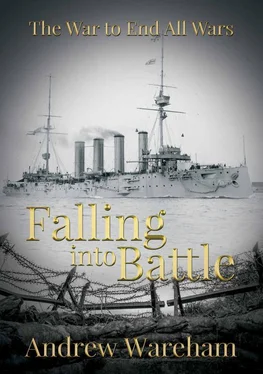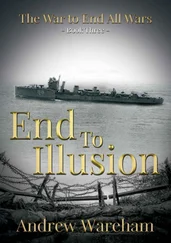“Suicide patrol, in effect, sir.”
“The Admiralty is panicking, Sturton. Until three days ago, they had entirely discounted the submarine. They did nothing worthwhile at Heligoland, after all. Now, suddenly, the submarine is a major menace – and they have no answer to it. The sole course available is to escort all valuable ships and to have additional patrols out to keep the submarines submerged and slow. There is a great panic to produce depth bombs and hydrophones and ships to carry them – but that cannot be done overnight. The soldiers must be carried to France – the position there is best described as chaotic still.”
“I had thought that the Battle of the Marne had stopped the German advance, sir, had put an end to the Schlieffen Plan?”
“Probably. It seems that the advance on Paris has most likely come to an end but both sides are spreading out east and west. There is a complete mess in Belgium – individual battalions and brigades here, there and everywhere and both sides pushing men in to try to stabilise a front. In the east, the word is that the French have fortified trenches all the way to the Swiss border. The Germans still occupy large chunks of northern France. No telling what will happen next – but General French is calling for more men and guns to cross the Channel.”
“Have we got more trained men?”
“No. A large navy predicates a small army. A country the size of Britain cannot run to both services. The needs of Empire demanded a great navy and so we ended up with a laughably small army, highly trained in musketry but tiny. The Kaiser has called it a ‘contemptible, little army’, which it is for size if not for training and effectiveness in the field. Trouble is, we cannot pull the garrisons out of Ireland and we have to retain some British forces in India and the lesser colonies, so a good half of our relatively few men are not available for France. Australia, New Zealand and Canada are sending men – but they haven’t got huge populations. South Africa is sending some battalions – but there’s a question mark there, only thirteen years after the end of the Boer War! There has been an uprising by some Boer farmers, we are told, though only small and quickly suppressed. For the rest, the volunteers are coming home from all over the world, and they are signing up by the hundred thousand in all four Home Countries, including all parts of Ireland, south as much as north.”
Simon nodded – volunteers were all very well, but they had to be trained.
“What of the Territorials, sir? There were a good few thousand of them, were there not?”
“Mostly in France by now, it would seem. Together with the reservists, they need no great training before going out. Still a bare hundred thousand, from all I gather. The French and Russians and Germans measure their armies in the millions. About the only thing to be said for the BEF is the standard of training of the infantry. Apparently, our riflemen are better marksmen than any of the others, due to most of them being long-service professionals, often with more than ten years of practice in the butts.”
“Does that compensate for the extra machine guns the Germans have, sir?”
“No. Nor for the Krupp guns, of which they have more and bigger than we do. The hope seems to be that German conscripts will be worn down more quickly than our hardened professionals. It might work out.”
“Talking of manpower, sir – what about India?”
“Millions of men there, Sturton. The Indian Army is already very big. We could probably bring a quarter of a million Indians across before Christmas. Good fighting men as well. Do we want to? What happens after we win? Could we then keep India?”
They contemplated that question and chose not to discuss it further.
“No word of Dacres, sir?”
“Nothing. His name is not on the lists of known survivors. He might be one of those picked up by British fishing boats and landed anywhere along the coast – there were a few dozen known to have been brought back that way. He could be in Holland. Chances ain’t that good, I fear.”
“He wasn’t one to look after his own skin, sir. Not when there was duty to be done.”
“Agreed.”
“I think I should write to his father, sir. The family was kind to me when I stayed with them.”
“And have written letters to you since, I believe?”
Reddening, Simon admitted that to be so.
They were sent to Dover, as expected, and fell into a routine of sailing back and forth across the narrow straits, scanning the sea for periscopes and seeing nothing. On most nights they patrolled the coast, hunting for marauding small ships that did not appear.
A couple of weeks of dull grind and they were called back to Harwich, all in a great hurry. Captain Smallwood was sent to a quick briefing with Tyrwhitt and came back at the run ordering Sheldrake and the half flotilla to sea immediately.
“Course for Ostend, full speed, Number One. The Naval Brigade has become a reality and is piling into the harbour there and onto the railway to Antwerp to bolster the garrison and prevent a Belgian collapse. In fact, the realistic hope is that they will delay the Germans by a few more days, weeks, if they are lucky, and reduce the pressure on the troops down towards Ypres where they are trying to create a stable front line. There is a ‘salient’ of some sort there, in the industrial areas and a chance of holding the Germans, provided they are not reinforced by the troops currently besieging Antwerp.”
“Yes, sir. What are we to do?”
“Hold the harbour; prevent any attack from the sea; cover hospital ships evacuating the wounded – they may not be marked up properly in the hurry to get them to sea. Unspoken, we are to provide a last way out for the Naval Brigade when it is forced to run.”
“Why send them in if they can’t be successful, sir?”
“It is a gesture of support to Belgium. A Quixotic gesture, one might say, on the part of the First Lord.”
“Churchill in person?”
“Just so. He possibly believes in the old nonsense that one Englishman is worth a dozen foreigners. He is ending a force mainly of Marines, armed with rifles and nothing else – no artillery at all to back them. There is no certainty of how many there are of them – or, at least, if there is, the figure has not been released for general consumption. I don’t know and Tyrwhitt don’t. Bloody pointless, if you ask me.”
Simon shrugged – after two months of war, he would believe any idiocy of their political masters.
“Shout hurrah and forget about thinking, sir. What are we to do specifically?”
“Enter Ostend harbour and see what is there, today. Contact the Port Captain, if there is one. If we receive orders from due authority, carry them out. The probability is that we shall be on our own, which means we must invent something to do. Work the coast at night and see if it comes out profitable again. There are thought to be Germans in the fishing harbours around Knokkeheist, close to the Dutch border where we were before. If there are, then we should try a bombardment in the hope of interfering with whatever they are doing.”
“We have done that already, sir. There must be a good chance they will be ready for another attack from the sea.”
“We have to do something, Number One.”
Simon nodded – there was nothing sensible to say.
“What else – oh, yes, of vital importance to us all, the Conspicuous Service Cross has been renamed and is now the Distinguished Service Cross. I am sure you will be much heartened to hear that, Number One.”
“Why, sir?”
“Well, as a decoration available to naval officers of lieutenant and below, you are eligible for it. The theory is that all young officers will be moved to acts of heroism on the strength of it.”
Читать дальше












